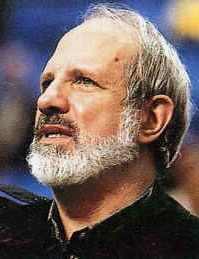Most people would say Scorsese takes the title, but Casino was more than 10 years ago. Since then he's made the incredibly exhausting Bringing Out The Dead, Gangs of New York, which I actually didn't bother seeing (holding out as I was for the inevitable release of his preferred four-hour cut, although that may never happen at this point and judging by what I've seen from popping in on it on TV, might not be what the world needs now), and The Aviator, which was like a Vanity Fair article come to life but also impersonal. His Dylan documentary was admittedly fine, although I've been told his primary role in the film was to assemble the footage, not to collect it. I saw the trailer for his latest, The Departed, and I fear another DiCaprio-centric disappointment; it doesn't seem to hold a candle to the source material, the zippy Hong Kong policier Infernal Affairs. The trailer even trots out the Rolling Stones' "Gimme Shelter", which is as much of a theme song cliché for Scorsese at this point as "Funeral March of a Marionette" was for Hitchcock.
You want to talk injustice when it comes to the Oscars? Scorsese has been famously robbed for the best director award twice, and I'm not talking about recent years, when he was clearly trying to win it. Meanwhile Brian De Palma, the director who actually discovered Robert De Niro, has never even been nominated.
Granted, in the last fifteen years De Palma has brought us a couple of stinkers (Mission: Impossible and especially Snake Eyes). Mission To Mars isn't ultimately very good either but at least each of these three films has one bravura setpiece.
De Palma has made three of my favourite films. Scarface is so good that not even every episode of 'MTV Cribs' featuring a bone-headed rapper with a framed Tony Montana head-shop poster mounted in his bedroom can take away from it (Scarface is like Star Trek for chavs; their devotion to it brings out something inescapably nerdy in them). It is the fastest three-hour film ever made, and almost the last word on the Reagan eighties.
 Carlito's Way was a film I saw religiously when it came out. No less an authority than 'Cahiers du Cinema' declared it to be the best film of the nineties. That might be pushing it, but it is wonderful, a Casablanca for this age (we will not speak of the ill-advised prequel he had nothing to do with). And I am a big defender of Femme Fatale, the sleazy, absolutely unhinged Eurotrashcapade that I'm still kicking myself about missing in the theatres. It was the closing night film of the 2002 Toronto film festival, and it must have been great to be in Roy Thomson Hall for the moment De Palma yanked the narrative rug out from under the audience; I'm sure it cleaved the room in twain. This is a director who is in touch with his unconscious.
Carlito's Way was a film I saw religiously when it came out. No less an authority than 'Cahiers du Cinema' declared it to be the best film of the nineties. That might be pushing it, but it is wonderful, a Casablanca for this age (we will not speak of the ill-advised prequel he had nothing to do with). And I am a big defender of Femme Fatale, the sleazy, absolutely unhinged Eurotrashcapade that I'm still kicking myself about missing in the theatres. It was the closing night film of the 2002 Toronto film festival, and it must have been great to be in Roy Thomson Hall for the moment De Palma yanked the narrative rug out from under the audience; I'm sure it cleaved the room in twain. This is a director who is in touch with his unconscious. Anyway, there's a new De Palma film on the way, and though the trailer for The Black Dahlia worried me somewhat (it's being marketed as Untouchable Chinatown Confidential) it does seem to contain the usual De Palma-isms; voyeurism, obsession, murder and dangerous, interchangeable dames, served up with sumptuous visuals and split diopters and blasted through a hall of mirrors. Plus Bulgaria, of all places, stands in for 1940s Los Angeles. That should be worth the price of admission right there. After Femme Fatale, I'm not missing another one in the theatres. I just hope his heart is in it.

No comments:
Post a Comment